| |
|
|
Seminar on
PAK-CHINA
Cooperation & Future of Regional Prosperity
Organised By
MUSLIM Institute
September 19, 2019
|
|






|
|
MUSLIM Institute organized a seminar titled ‘Pak-China Cooperation and Future of Regional Prosperity’ at Islamabad Club, Islamabad. Ambassador (R) Riaz Mohammad Khan, the Former Foreign Secretary of Pakistan chaired the seminar. Mr. Usama Bin Ashraf (Research Associate MUSLIM Institute) moderated the proceedings of the seminar. Ambassadors, scholars, university professors, lawyers, journalists, political leaders, students, social activists and people from different walks of life participated in the seminar.
The summary of the remarks shared by the expert panelists are as follows:
|
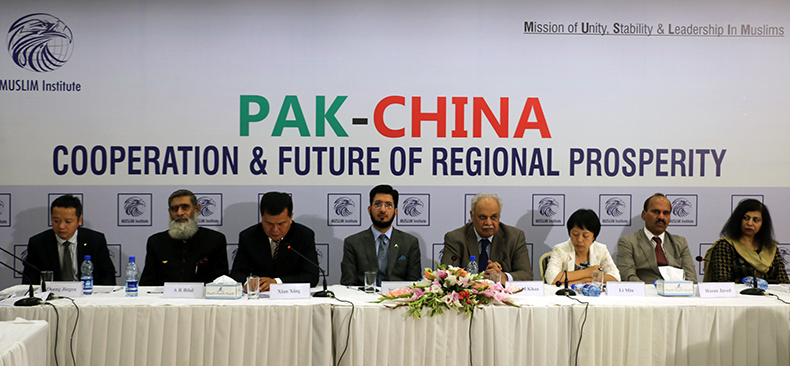
Penalists of the Seminar.
|

|
Welcoming Remarks
Sahibzada Sultan Ahmad Ali
Chairman MUSLIM Institute
|
|
I would like to warmly welcome the delegation of Yunnan University lead by Mr. Shen Xian Xing to the seminar. The time-tested, Pakistan-China all-weather cooperative partnership is an anchor for peace and stability in the region and beyond. The political instability in Afghanistan and the illicit destabilizing activities from the Indian side in Pakistan and the region, are some of the notable challenges faced by the region. India has never accepted either BRI or CPEC and even categorically rejected this cooperative venture. Although India has failed to abet the comity of nations against Sino-Pak cooperation for the regional prosperity, it keeps on quoting false excuses to counter it. India was the only member country of SCO that did not endorse the BRI projects in the Qingdao Declaration. Frustrated and flustered, following the Chanakya’s policy, India has been trying to disrupt the CPEC through anti-state activities since the inception of this project. The only way for socio-economic development in the region is through peace by countering the negative forces and malicious agendas. Therefore, both China and Pakistan have to cooperate with each other on various regional issues in order to maintain regional peace and security.
|
|
|
Guest of Honour
Ms He Ruifang
Institute of South Asia Studies, Yunnan Academy of Social Sciences, China
|
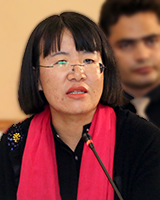
|
|
China’s dependence on oil and gas import is increasing by each passing year. China imports much of its oil through the Indian Ocean. Indian Ocean is important for China not only to deepen the cooperation with the regional countries but also for its multidimensional security. Undoubtedly, there are multiple challenges due to politics of Indian Ocean. India is always sceptical to China and has hostile relations with all its neighbours. Gwadar port provides China the safest as well as alternative route to quench its energy needs. CPEC has created new model of bilateral economic cooperation. The Sino-Pak friendship has always been of mutual trust and solidarity in times of adversity. It is an exemplary state to state friendship. The concept building a ’China-Pakistan community of shared future’ is proving to deepen all-round cooperation. However, security cooperation with neighbours is important for sustainable development of the region.
|
|
|

Stage View during the Seminar.
|
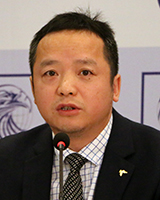
|
Guest of Honour
Prof Dr Zhang Jiegen
Second Secretary Chinese Embassy, Islamabad
|
|
For past 70 years, China Pakistan relationship is a classic example of friendship between two countries with different cultural and political system. Since the application of Free Trade Agreement between China and Pakistan in July 2007, Pakistan’s exports to China have increased by threefold. Under CPEC, 15 projects have been completed and 10 are in smooth processing. Among them, energy projects would provide more than 20% electricity to Pakistan. Now CPEC has entered in its second phase which is a high quality development phase. China is becoming a global power while Pakistan enjoys regional advantage of its unique strategic location. Pak-China cooperation is a key to regional stability and prosperity. In terms of security, things are fast changing in the South Asian region due to incidents like Pulwama Attack and abrogation of article 370 of the Indian Constitution. Behaviour of India is now more aggressive which may have destructive geostrategic implications for the region.
|
|
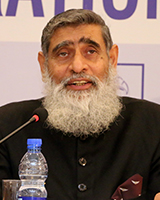
|
Guest of Honour
Brig (R) Abdul Rahman Bilal
Writer and Analyst
|
|
There is a dire need to involve maximum stake holders into the mainstream projects of CPEC including Afghanistan as it is precursor for peace. Deliberate opposition of the project by India needs to be addressed prudently. US trade war with China and weak economic condition of Pakistani economy are major challenges that need to be dealt immediately. With respect to security, although CPEC provides China the best possible alternative to the Indian Ocean yet comprehensive Pak-China alliance should be drafted in accordance with the changing regional apparatus. Schengen type arrangements are needed to enhance the stability of regional security. Inclusion of China-Arab States Cooperation Forum (CASCF) and Iran in the mainstream projects of BRI and CPEC has become inevitable to channelize regional security in accordance with changing world politics. In order to further strengthen sustainable strategic partnership, frequent exchange of views on regional and international developments in regional and global forums as well as exchange of high level visits and experts delegations is the need of the hour.
|
|
|
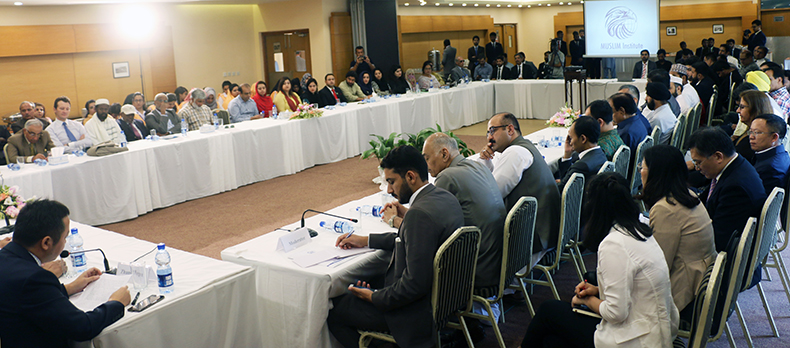
Stage View during the Seminar.
|
|
Guest of Honour
Dr. Waseema Shahzad
Dean Social Sciences, Air University, Islamabad
|
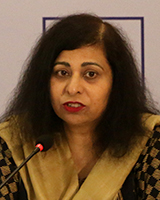
|
|
The regions across the northern alignment and northern parts of eastern, southern and central alignments of the CPEC are highly diverse linguistically. Therefore, the possibility of language contact among Pakistani languages and Chinese languages would definitely increase in these areas across these alignments. These alignments can serve as one of geographical linguistic divisions of Pakistan in future. These linguistic divisions may also cause emergence of several new social groups based on new varieties of languages i.e. pidgins and creoles. There would be several economic zones in all the provinces of Pakistan emanating into many hubs and clusters of massive interaction among the people of Pakistan and China.
|
|
|
Guest of Honour
Ms Li Min
Director Pakistan Research Centre, Yunnan Academy of Social Sciences, China
|
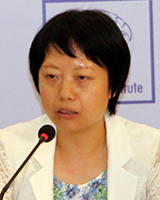
|
|
The future of economic projects like BRI and CPEC is heavily dependent upon peace in Afghanistan. Pakistan and Afghanistan are closely connected in religion, culture, language and ethnicity. Moreover, both Pakistan and Afghanistan have important geopolitical connections. Any solution to Afghanistan that ignores the importance of Pakistan will be a failure. The Afghan issue is not an internal issue of Afghanistan but a regional issue that must be resolved in a coordinated manner of regional stakeholders. China’s regional influence and economic power, as well as its friendly relationship with Pakistan, have made China increasingly indispensable as a major regional player in Afghanistan. Despite the contradictions and frictions between China and the United States of America in trade and other areas, the USA has to admit that China is one of the main participants in the peace talks in Afghanistan.
|
|
|
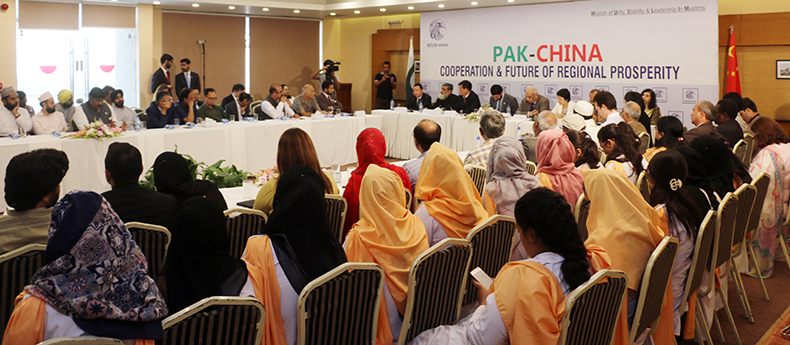
Participants and stage view of seminar.
|
|
Guest of Honour
Ambassador (R) Syed Hassan Javed
Director Chinese Studies Centre, School of Social Sciences and Humanities, National University of Science & Technology (NUST), Islamabad
|
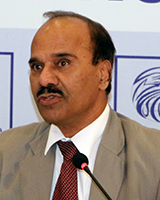
|
|
China’s rise is helping all developing nations to actualize their dreams of prosperity. The report of the 19th Communist Party of China (CPC) National Congress urged replacement of "estrangement with exchange, clashes with mutual learning, and superiority with coexistence" in handling relations among civilizations. As has often been stressed, this approach had served to maintain China's sound relations with countries of different cultural backgrounds, and particularly those in the Islamic world, and will now serve Chinese efforts to build a community of a shared future for all. China is developing two Special Economic Zones in Xinjiang‘s city Kashghar near Pakistan border and Khorgos on border with Kazakhstan. The development of Kashghar and Gawadar as the Special Economic Zone (future ‘Shenzhen’) will open up enormous opportunities for both countries as export/import outlets. Up-gradation of Karakoram Highway, rail links and oil and gas pipelines would connect China to Gulf Region, South Asia, West Asia, Africa and Europe through Gwadar and Karachi.
|
|
|
Special Remarks
Mr. Shen Xian Xing
Vice President Yunnan Academy of Social Sciences, China
|
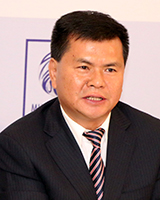
|
|
We are very clear that the cultural and people to people contact between China and Pakistan is lagging behind the development of our friendly relations. Pakistan and China have long been cooperating in science and technology, tourism and in many other fields. In the Yunnan Academy of Social Sciences, we have cooperation with academic institutions and scholars in Pakistan. The Yunnan Academy of Social Sciences is the first one to formally establish a cooperative mechanism with social science institutions in Pakistan. Yunnan, in many ways is similar to Pakistan. The Yunnan Academy of Social Science and think-tanks of Pakistan have the same topics of concern. An enhanced cooperation is needed between Yunnan and capital Islamabad in various walks of life. I firmly believe not only from the political leadership but also from our experts that we have the same ideas which fasten our developing nations.
|
|
|
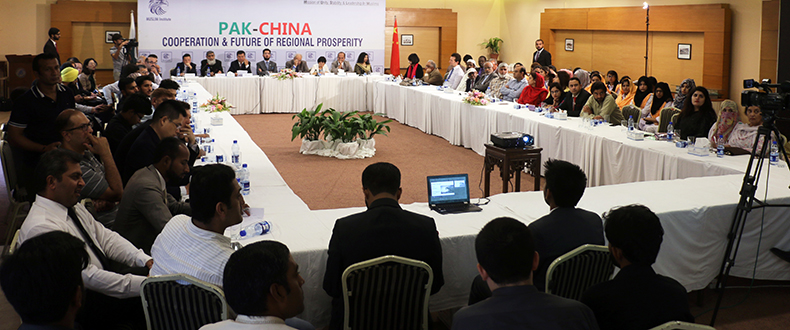
Participants view during the seminar.
|
|
Interactive Session
|
|

Participants asking questions in interactive session.
|
|
After the remarks shared by honourable panellists, interactive session was held. The summary is given as following;
Q1: How CPEC corridor can be transformed into a knowledge corridor?
Answer: This is an age of knowledge economy. At higher education level, joint research journals and joint research projects in different areas can help in this respect. University exchange programs should be introduced. Both countries can have different exchange programs and by exchange of professors in the Chinese universities we can learn in numerous ways to transform CPEC into an educational corridor. If Pakistan can produce nuclear weapons, have best doctors in the U.S and have people representing Pakistan in NASA, then there is nothing wrong with our intellect and talent. We have a glorious history behind us and can play a positive role in future.
Q2: What are threat perceptions about non-kinetic and non-traditional threats of CPEC especially in the northern areas?
Answer: In northern areas we don’t have any threats. The people of northern areas are extremely patriotic and have proved themselves so during many occasions including the Kargil war. The fifth generation warfare (5GW) is a new kind of warfare which can pose threats to CPEC. We need to keep our eyes open especially with regard to the machinations adopted by India in this respect.
|
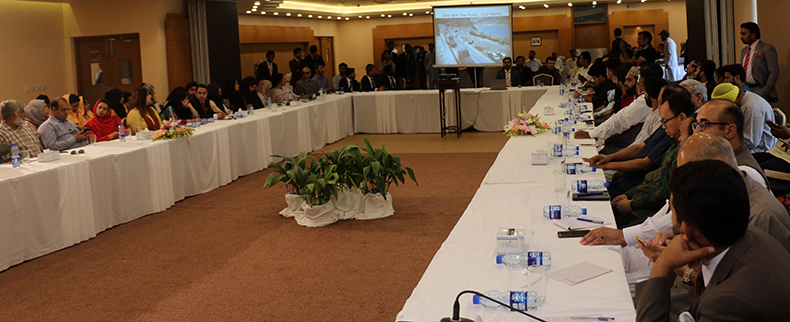
Participants view during the seminar.
|
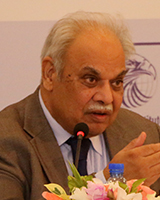
|
Chair of the Session
Amb (R) Riaz Mohammad Khan
Former Foreign Secretary of Pakistan
|
|
China has achieved so much progress in a very short time. They have won this century through their technological and industrial advancement. China has always worked for regional cooperation. Their leadership has inspired other nations with their prime vision of shared prosperity. From a couple of decades China is progressing fast and is going to become world’s leading economy. Many countries snatched economic prosperity through military means but China achieved the same through their economic vision. Over decades, the strong and resolute cooperation between the two countries has now become an indispensable and enduring factor in the development of our region. Chinese are very clear regarding their political vision. Similarly, we are also very clear not only at our leadership level but also at the level of public sentiments. We have to translate this clarity into a vision and a practical approach through hard work and determination. We have to do a lot of work on CPEC, on our energy policies and in our industrial and technological sector.
|
|
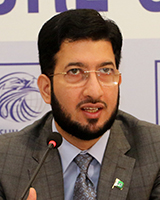
|
Vote of Thanks
Sahibzada Sultan Ahmad Ali
Chairman MUSLIM Institute
|
|
On the behalf of MUSLIM Institute, I am grateful to all the distinguished guests, panellists, Chair of the session and especially the delegation of Yunnan University.
|
|
|
| |
|
|
|
|
|
| |
|